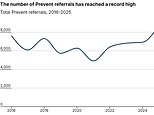There were a record 8,778 referrals to the Government’s anti-extremism programme Prevent over the last year, a rise of 27 per cent.
The total for 2024/25 is up 27 per cent from 6,922 referrals the year before – pushing it to the highest figure since data began in 2015.
Children aged 11 to 15 accounted for the largest proportion of cases (3,192 or 36 per cent), followed by 16-17-year-olds (1,178, or 13 per cent).
There were 345 referrals for children aged 10 or under.
Extreme right-wing ideology was the most common concern cited by officials, accounting for 21 per cent, higher than the tenth that were related to Islamic extremism.
The proportion of referrals for extreme right-wing concerns increased by two per cent year on year slightly, while the proportion for Islamist extremism fell from 13 per cent to 10 per cent.
More people suspected of having an obsession with violence have been referred to Prevent since the Southport knife attack, it emerged earlier this week.
Axel Rudakubana murdered Bebe King, six, Elsie Dot Stancombe, seven, and Alice da Silva Aguiar, nine, and attempted to murder 10 others at a Taylor Swift-themed dance class on 29 July last year.
Prevent director Cathryn Ellsmore told an inquiry into the atrocity: ‘What we have seen post the Southport attack is a sharp increase in referrals to Prevent where there are concerns about violent fixation.’
Ms Ellsmore said she did not know whether this increase was due to officials making more referrals because their ‘risk tolerance’ had fallen since the stabbings, or whether there had been a ‘previous underestimate of the cohort’.
Rudakubana had been referred to Prevent three times but did not meet the threshold for further intervention.
Prevent, which is run by the Home Office, aims to stop terror attacks, with officials working with local authorities and community organisations to seek to deradicalise those deemed to have concerning ideologies.
But the flagship £49million-a-year scheme has faced criticism over its failures in spotting Islamic terrorists.
Just over a third of Prevent referrals last year had at least one mental health or neurodiversity condition recorded.
Autistic Spectrum Disorder (ASD) was the most common condition recorded, in 14 per cent (1,226) of all referrals.
dailymail,news,The Home Office
#Record #referrals #governments #antiextremism #scheme #Prevent #year #previous #months

